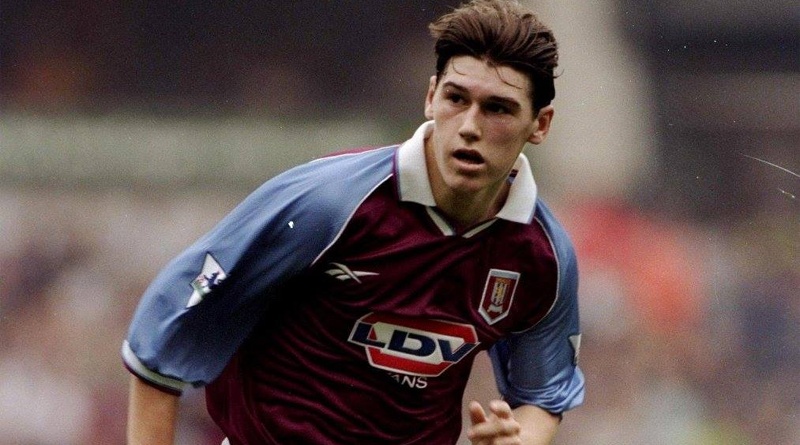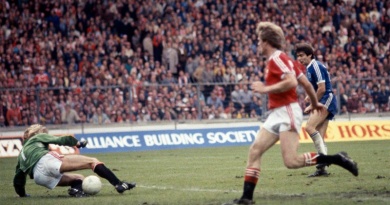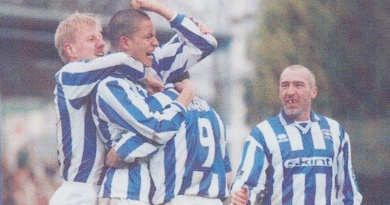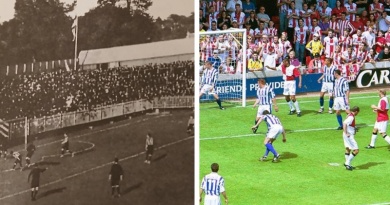Brighton, Villa, Seagulls on heads and the Battle for Gareth Barry
Brighton and Aston Villa may be regular foes in the Premier League these days, but back in 1998 the only place they crossed swords was in an FA tribunal over a 17-year-old by the name of Gareth Barry.
It was the culmination of an incredible battle between the clubs which ended with Villa having to pay the Albion over £1 million.
Barry subsequently became the Albion’s first ever million pound sale, without ever having kicked a ball for the Brighton first team.
Seagulls chairman Dick Knight had struck a stunning blow for the little man against the wealth and might of the top division of English football.
Even back then, Premier League clubs acted with impunity, self-interest and no concern over what was good for the rest of the pyramid.
For scrapping FA Cup replays in 2024, see poaching young talent from lower division clubs knowing there was little chance of having to pay more than a nominal compensation fee. Knight though changed that.
Born in Hastings, Barry was spotted and signed by the Albion as a nine-year-old. Brighton spent six years developing him, after which they offered him a youth contract when he turned 16.
Villa though were already sniffing around. Barry subsequently turned down Brighton and moved to Villa Park. All that time and money the Albion had invested into Barry had now been completely wasted.
This sort of thing happened all the time. Smaller club developed player up to the age of 18, who subsequently could have gone onto make their first team and been sold for a lot of money. Premier League club instead poached them before professional contract with smaller club could be signed.
The problem Villa faced is they had not done their homework on Knight. This was the man who had saved Brighton from Bill Archer, Greg Stanley and David Bellotti.
Who was now fighting to take the club back to Sussex from exile in Gillingham and about to launch what would prove to be a decade-long battle to build a new stadium on a muddy field in Falmer.
Villa offered Brighton £3000 in compensation for Gareth Barry, the minimum amount they had to under FA rules at the time. This derisory figure only served to further incite Knight into getting what he felt was market value for Barry.
The other problem for Villa is that Knight had spent the past six seasons watching Barry play for the Albion from Under 9s through the Under 16s.
Gareth Barry grew up in the same Brighton side as Knight’s great nephew Michael Standing, who also joined Villa at the same time. Knight knew the potential Barry had, even before he burst onto the scene with Villa.
And so in October 1998, the chairman of cash-strapped Brighton arrived at an FA hearing alongside Albion boss Brian Horton, club secretary Derek Allen and Barry’s former youth team coach Les Rogers.
Villa were represented by their manager John Gregory, fresh off the plane from his side’s 1-0 UEFA Cup win away against Celta Vigo.
By the time of the tribunal, Barry was already in the Villa first team. The Celta game was his 13th senior appearance at the age of only 17.
This strengthened Knight’s case that Barry was worth far more to a struggling Division Three club like Brighton than the £3000 Villa had offered.
The arrogant Gregory meanwhile claimed he alone had turned Barry from a midfielder into a defender, which was why the teenager was now a first team regular. According to the Villa boss, Brighton did not even realise they had such a talented defender on their books.
Knight countered by pointing out Barry had played in both defence and midfield for the Albion; he knew this having personally watched Barry play because of the presence of Standing in the same age group youth teams.
The tribunal were seemingly more impressed by Knight’s insistence that Barry would play for England one day. And that if he did, Brighton needed to be adequately compensated for developing a player good enough to represent and benefit the country.
Knight argued that without suitable compensation, there would be no incentive for the Albion or other Football League clubs to invest in youth.
Speaking after the tribunal, Knight summed up the argument he had made: “This will affect the future of English football. If we hadn’t got this result there would have been no point in investing in youth when the top clubs could just come along and cherry-pick.”
And what a result it was. The tribunal ruled Villa had to pay Brighton £150,000 immediately for Gareth Barry as reward for the Albion’s work producing such a talent.
The total fee would rise to £1.3 million if Barry made 60 first team appearances for Villa and went onto play for England, alongside a 50 percent sell on fee.
It did not take long for Barry to achieve those targets and the Albion’s coffers to be swelled by a much-needed seven figure sum.
By the end of the 1999-2000 season – 18 months after the tribunal – Barry had clocked up 60 games for Villa. He made his England debut soon after, coming on as a substitute against Ukraine before the Three Lions headed to Euro 2000.
What made this whole episode even more bizarre was the part of Gregory, who had actually played for Brighton 17 years earlier.
Gregory made 81 appearances for the Albion, scored seven times, played a huge role in a dramatic escape from relegation in 1981 and was only sold because a £300,000 bid from Queens Park Rangers was too good to turn down.
You might think all of that would have left him sympathetic and understanding to his former club’s position; now homeless, broke and three divisions lower than when he left the Goldstone Ground.
But no. Gregory instead was seething with the judgement. “Dick Knight wouldn’t recognise Gareth Barry if he stood on Brighton beach in an Albion shirt with a ball tucked under his arm and a seagull on his head,” said Gregory afterwards.
Whatever you say, John…




